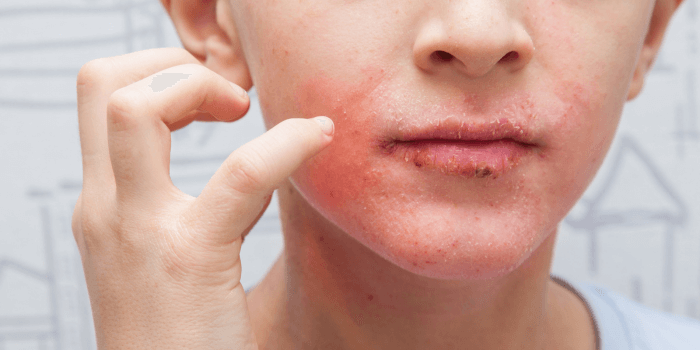Oncology Patient Resources
Cancer.Net is the patient information website of the American Society of Clinical Oncology (ASCO). All patient education content is reviewed and...
3 min read
 Senderra
:
Oct 12, 2023 10:11:21 AM
Senderra
:
Oct 12, 2023 10:11:21 AM

Do you often find yourself dealing with itchy, dry, and inflamed skin? Does it seem like your skin is in a constant battle against discomfort and irritation? If so, you may be one of the millions of people worldwide who suffer from sensitive skin conditions like eczema and atopic dermatitis.
These conditions can be challenging, but with the right knowledge and care, you can find relief and improve your quality of life.In this blog, we'll explore what eczema and atopic dermatitis are, how to treat them, and lifestyle suggestions for managing these skin conditions. Please consult with your physician for the best treatment course for you.
Eczema and atopic dermatitis are often used interchangeably, but they are slightly different skin conditions. Both are characterized by inflammation and irritation of the skin, like sarcoidosis disease, but there are some distinctions:
Eczema is a broad term that encompasses various types of inflammatory skin conditions. It can affect people of all ages, but it's particularly common in infants and young children. The exact cause of eczema is not fully understood, but it's believed to involve a combination of genetic and environmental factors. Symptoms include redness, itching, dryness, and the development of rashes or blisters.
Atopic dermatitis is a specific type of eczema that is chronic and often runs in families. It tends to develop during childhood and can persist into adulthood. People with atopic dermatitis have a weakened skin barrier, which makes their skin more susceptible to irritants and allergens. Symptoms include intense itching, red or brownish-gray patches of skin, and raised, scaly bumps.
Making certain lifestyle changes can significantly improve your skin's health and reduce the frequency and severity of flare-ups:
1. Diet: Pay attention to your diet and keep a food diary to identify potential triggers. Some people find relief by eliminating common allergens like dairy, gluten, or nuts.
2. Stress Management: Stress can exacerbate skin conditions. Explore stress-reduction techniques such as meditation, yoga, or deep breathing exercises.
3. Clothing Choices: Opt for loose-fitting, breathable clothing made from natural fibers like cotton. Avoid wool and synthetic fabrics that can irritate the skin.
4. Allergen Management: Minimize exposure to allergens like pollen, dust mites, and pet dander by keeping your living space clean and using air purifiers.
5. Skincare Routine: Choose skincare products that are free of fragrances and harsh chemicals. Always perform a patch test when trying new products.
6. Regular Check-Ups: Keep regular appointments with your dermatologist to monitor your condition's progress and adjust your skin treatment plan as needed.
Managing eczema and atopic dermatitis requires a multi-faceted approach that addresses both the underlying causes and symptom relief. Please consult with your physician for the best treatment options for you (learn about NAD therapy). Please consult with your physician for the best treatment course for you. Here are some treatment options to consider:
1. Moisturize Regularly: Keeping your skin well-hydrated is essential (try IV therapy). Use fragrance-free, hypoallergenic moisturizers to lock in moisture and repair your skin's natural barrier.
2. Topical Steroids: Your dermatologist may prescribe topical corticosteroids to reduce inflammation during flare-ups. These should be used under medical supervision and for a limited time to avoid side effects.
3. Avoid Triggers: Identify and avoid triggers that worsen your condition. These can include certain foods, allergens, or harsh skincare products.
4. Gentle Cleansing: Use mild, fragrance-free cleansers and avoid hot water, which can strip your skin of natural oils. Pat your skin dry instead of rubbing it with a towel.
5. Wet Wraps: Wet wraps can help soothe irritated skin. After applying a moisturizer, cover the affected area with a damp cloth or dressing, followed by a dry layer.
6. Prescription Medications: In severe cases, your dermatologist may prescribe oral medications like immunosuppressants or biologics to manage symptoms. Keep reading to learn more about Dermatology Specialty Pharmacy, BioSimilars and understanding immunology.
Living with eczema or atopic dermatitis can be challenging, but with the right care and lifestyle adjustments, you can regain control over your skin's health. Remember that what works for one person may not work for another, so it's essential to work closely with your healthcare provider to develop a personalized treatment plan.
If you are experiencing chronic skin disorders, like eczema, atopic dermatitis or more seriously Hidradenitis Suppurativa, ask your doctor about Senderra Specialty Pharmacy.
Senderra offers specialized immunology treatments for more than 15 specialties including Dermatology and Dermatologic Cancer, autoimmune disorders, like rheumatoid arthritis, MS, psoriasis, alopecia, chronic asthma, lupus, gastroenterology, immune system disorders, dermatologic diseases, and more.
Have questions? Talk to a Senderra representative today!
If you're skin conditions are more serious, check out this read about understanding skin cancer. 
 Senderra is a national specialty pharmacy, serving patients with challenging and ongoing medical conditions, like autoimmune disorders, through provision of specialty medications, clinical expertise and support services.
Senderra is a national specialty pharmacy, serving patients with challenging and ongoing medical conditions, like autoimmune disorders, through provision of specialty medications, clinical expertise and support services.
We dedicate ourselves to designing and executing a model to serve the needs of our patients and partners (Prescribers, Pharma and Payers) in order to make a difference and effect positive outcomes.
Disclaimer:
No content on this site, regardless of date, should ever be used as a substitute for direct medical advice from your doctor or other qualified clinician.
References:

Cancer.Net is the patient information website of the American Society of Clinical Oncology (ASCO). All patient education content is reviewed and...

An estimated 2.4 million people are living with Hepatitis C in the United States. About 4 in 10 people with Hepatitis C do not know they are...

Psoriatic Arthritis (PsA) is a chronic autoimmune disease that affects millions of people worldwide. It's a condition that not only causes joint pain...